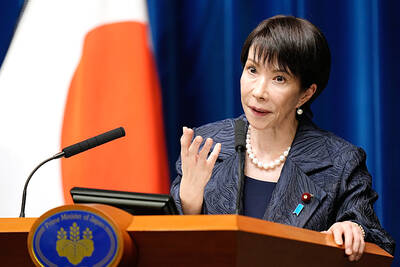People with an annual income of NT$620,000 (US$20,495) or less would be exempt from income tax when filing taxes in May next year, President William Lai (賴清德) said on Sunday, although a Chinese Nationalist Party (KMT) legislator said such an exemption already existed.
The exemption would benefit 40 to 50 percent of the population, making this year the year with the “lightest tax burden” in the nation’s history, Lai said, adding that the majority of income tax would be paid by the top 1 percent of earners.
Democratic Progressive Party caucus secretary-general Chen Pei-yu (陳培瑜) yesterday said that the tax cuts still need to be discussed with the Ministry of Finance and require comprehensive supporting measures.

Photo: Tyrone Siu, Reuters
However, the policy was met with doubt by the opposition party, with KMT Legislator Hsu Yu-chen (許宇甄) calling it empty political rhetoric, essentially using the existing system to deceive the public.
This year’s exemptions and deductions already include a personal exemption of NT$97,000, a standard deduction of NT$131,000, a salary deduction of NT$218,000 and a rental deduction of NT$180,000, totaling NT$626,000 per taxpayer, Hsu said.
Tax exemptions for those earning NT$50,000 per month have been in effect since the tax filings for last year, she said.
Taiwan’s tax structure is highly imbalanced, she said, adding that Ministry of Finance data showed that in 2023, 43.8 percent of the 6.883 million income tax filings were tax-exempt.
About 64,000 households, or 0.93 percent of all households nationwide, had net taxable income — total income minus exemptions and deductions — of more than NT$5 million, which accounted for NT$207.9 billion or 43.3 percent of income tax revenue, including dividend taxes, Hsu said.
Therefore, less than 1 percent of wealthy households paid more than 40 percent of total income tax revenue for 2023, Hsu said.
The data also reflected low incomes across the nation, she said.

The Ministry of Foreign Affairs (MOFA) yesterday voiced dissatisfaction with the Comprehensive and Progressive Agreement for Trans- Pacific Partnership (CPTPP), whose latest meeting, concluded earlier the same day, appeared not to address the country’s application. In a statement, MOFA said the CPTPP commission had "once again failed to fairly process Taiwan’s application," attributing the inaction to the bloc’s "succumbing to political pressure," without elaborating. Taiwan submitted its CPTPP application under the name "Separate Customs Territory of Taiwan, Penghu, Kinmen and Matsu" on Sept. 22, 2021 -- less than a week after China

THE GOOD WORD: More than 100 colleges on both sides of the Pacific will work together to bring students to Taiwan so they can learn Mandarin where it is spoken A total of 102 universities from Taiwan and the US are collaborating in a push to promote Taiwan as the first-choice place to learn Mandarin, with seven Mandarin learning centers stood up in the US to train and support teachers, the Foundation for International Cooperation in Higher Education of Taiwan (FICHET) said. At the annual convention of the American Council on the Teaching of Foreign Languages held over the weekend in New Orleans, Louisiana, a Taiwan Pavilion was jointly run by 17 representative teams from the FICHET, the Overseas Community Affairs Council, the Steering Committee for the Test of Proficiency-Huayu, the

A home-style restaurant opened by a Taiwanese woman in Quezon City in Metro Manila has been featured in the first-ever Michelin Guide honoring exceptional restaurants in the Philippines. The restaurant, Fong Wei Wu (豐味屋), was one of 74 eateries to receive a “Michelin Selected” honor in the guide, while one restaurant received two Michelin stars, eight received one star and 25 were awarded a “Bib Gourmand.” The guide, which was limited to restaurants in Metro Manila and Cebu, was published on Oct. 30. In an interview, Feng Wei Wu’s owner and chef, Linda, said that as a restaurateur in her 60s, receiving an

MORE RETALIATION: China would adopt a long-term pressure strategy to prevent other countries or future prime ministers following in Sanae Takaichi’s steps, an academic said Taiwan should maintain communications with Japan, as Japanese Prime Minister Sanae Takaichi is to lead a revision of security documents, Taiwanese academics said yesterday. Tensions have risen between Japan and China over remarks by Takaichi earlier this month that the use of force against Taiwan would constitute a “survival-threatening situation” for Japan. Prospect Foundation president Lai I-chung (賴怡忠) yesterday said Takaichi’s stance regarding Taiwan is the same as past Japanese prime ministers, but her position is clearer than that of her predecessors Fumio Kishida and Shigeru Ishiba. Although Japan views a “Taiwan contingency” as a “survival-threatening situation,” which would allow its military to